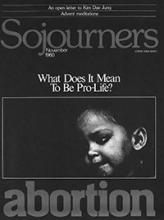The conviction that each human life is sacred has its roots in the scriptures. There God is revealed as the living God who bestows life. In contrast to the Gentile nations who manufacture gods in their image, Yahweh fashions human beings in God's image (Genesis 1: 26, 28). Each person thus is vested with an inviolable dignity on the basis of his or her creation. From this flows the Torah's sixth commandment (Exodus 20:13) which functions not only as a prohibition of murder, but as a positive injunction to respect human life. Thus when Jesus assumes the role of Moses and expounds the law in the Sermon on the Mount (Matthew 5:17-20), he reveals that the commandment in fact requires that we love our neighbors, not merely that we do them no physical harm (Matthew 5:21-26).
The premium placed on human life gives childbirth a redemptive dimension in the scriptures. It is Eve's seed which ultimately will crush the head of the serpent (Genesis 3:15), Abraham's seed which will inherit the promise (Genesis 15:1-5), David's descendant who will occupy Jerusalem's throne forever (2 Samuel 7:12-16). That fertility is presented as a blessing (Exodus 23:26) and barrenness a curse (e.g., Genesis 21:1ff) is therefore not so much a reflection of an agrarian or a patriarchal ethic as it is of the salvific hope of the ingathering of the full number of God's elect. The Old Testament writers did not see biological reproduction as merely a natural event. Childbirth, for them, is a sign of God's favor. It is grace.
So also prenatal development is portrayed as a season of divine activity:
For you created my inmost being;
you knit me together in my mother's womb. I praise you because I am fearfully and wonderfully made;
your works are wonderful,
I know that full well. My frame was not hidden from you
when I was made in the secret place. When I was woven together in the depths of the earth,
your eyes saw my unformed body. (Psalm 139:13-16)
Read the Full Article

